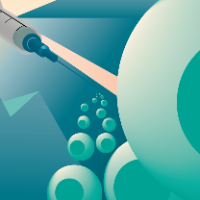Next-generation DNA vectors: is the nS/MARt platform a viable alternative to viruses for autologous T-cell immunotherapy?
Cell & Gene Therapy Insights 2021; 7(10), 1487–1493
10.18609/cgti.2021.196
Cancer has a major impact on society and healthcare systems across the world, and by 2040 the number of new cancer cases per year is estimated to rise to almost 30 million. T-cell based adoptive immunotherapies rely on the delivery of genetically engineered T cells to patients. This methodology has developed enormously over the last decade, becoming one of the most promising therapeutic strategies for treating a range of malignancies. In recent years, several T-cell therapies have been granted Food and Drug Administration (FDA) approval including tisagenlecleucel (Kymriah®), axicabtagene ciloleucel (Yescarta®), brexucabtagene autoleucel (Tecartus®), and idecabtagene vicleucel (Abecma®). With increasing numbers of adoptive cellular therapies (ACT) in advanced clinical stages and the corresponding increased burden to create personalized pipelines, it is essential to explore alternatives. Ideally these manufacturing protocols need to be quick, reliable, safe, and financially sustainable. Currently, most protocols rely on viral vectors that have long and expensive manufacturing times that accordingly reduce the number of patients eligible for ACT therapies. Next-generation non-viral RNA and DNA vectors have emerged as an attractive alternative for introducing CARs or TCRs into immune cells; while maintaining a high efficiency of delivery, they are more versatile and are simpler and quicker to manufacture at scale, thus increasing the number of patients who can be treated while significantly reducing the vein-to-vein time of the treatment process. In this article we highlight the advantages offered by these alternative next-generation vector platforms with a particular emphasis on the nS/MARt DNA vector system recently described by the authors at the German Cancer Research Centre, in Heidelberg.
